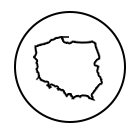Szymon and Stanisława Kamiński from Ruda village
 Place
PlaceSołki
 People
PeopleKamiński Szymon
Kamińska Stanisława
Kamińska Weronika
Szymon and Stanisława Kamiński lived in the village Ruda together with Szymon’s mother, Weronika. They married in the thirties and had two young children (2 and 4 years old).
On September 17, 1939, the village was taken over by the Russians.
During the celebration of the October Revolution Anniversary, soldiers began firing fireworks. Nearby houses and farm buildings were covered with straw. One of the barns caught fire, which quickly spread, almost consuming the entire village. Kamiński were left without a roof over their heads.
It was Autumn. Family lived in the dugout. Children caught red fever and died. After some time Kamiński received logs for the construction of their new home. Their neighbours and Stanisława’s family helped them build a house in the colony Modzelówka, 4 km from Ruda. They moved in, while it still wasn’t finished yet. In 1940, their son Mieczysław was born. Across the road, other victims of the fire, Mr and Mrs Zyskowscy, built their home. After a short while they were evicted by German soldiers and a guard post was set up in their home. Biebrza Swamp was nearby, where a guerrilla was formed.
In the autumn of 1940 an unexpected guest knocked on the Kamińskis’ door. Lycyna Jelińska, daughter of Kaminski, writes: “One autumn night, my parents heard knocking on the kitchen’s window. It was year 1940. They thought that the Germans came for them. Mommy got up without lighting the oil lamp, opened the curtain and saw a young, maybe 12 years old, girl outside. She opened the door and quickly let her inside. It was a Jewish girl from Grajewo, who escaped from the round-up and walked 12 km through the forest and fields up to our house. What would have happened if she went to the window of our Jewish neighbours Zyskowscy, where Germans were stationed. There were no other houses around.”
The girl was crying, she was hungry and cold. Kamiński family didn’t refuse to help the child. They fed her, gave her warm clothes, prepared food for the road. When Stanisława realized that the neighbours were asleep, she led the girl to a safe place. Lucyna describes it like this: “She went with her through the backyard and into the forest, through the forest until they reached the bridge on the river Ełk, through the bridge, meadows and bushes she led her to her friends – trusted people in the village of Sołki, where there was no German outpost. My parents’ plan was good. Germans didn’t hear nor did they notice anything. Jewish girl found a safe place and my mommy returned safely during the day.”
Lucyna Jelińska sums it up: “ I think that this act of heroism from my beloved parents is something worth commemorating. My parents during the occupation lost two children, house, barn and a pigsty. Having German soldiers “right under their nose” – about 20 meters away – they took care of a Jewish child and escorted it to safety.”
Bibliography:
- FLV, List od Lucyny Jelińskiej, Piaseczno, 27.01.2014 r.
DOCUMENTS:
No extra materials